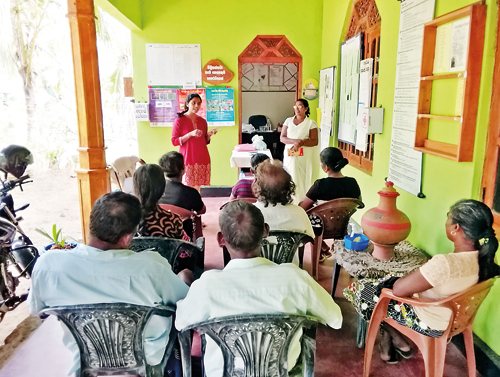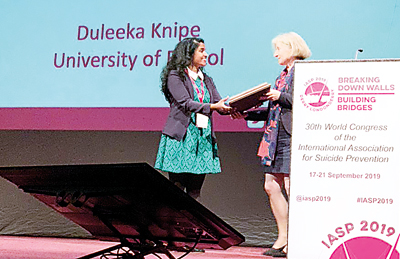From Bristol to A’ pura on a life-saving mission

A community workshop with Dr. Duleeka Knipe in the Tambuttegama Divisional Secretariat area
Steadfastly and silently, a crusader against self-harm has been working at grassroots level in remote areas of Anuradhapura as well as at her research bench in Bristol to provide evidence-based facts and figures to bring about effective preventive interventions not just in Sri Lanka but across the world.
This year has been extraordinary for Sri-Lankan born Dr. Duleeka Knipe, fondly called Dee, who is based at the University of Bristol Medical School in the United Kingdom (UK).
Not only has she been presented the prestigious De Leo Fund Award of the International Association of Suicide Prevention (IASP) just last month (on September 17), she is also the proud mother of a baby boy born earlier this year.
Dr. Knipe who is Elizabeth Blackwell Institute Vice Chancellor’s Fellow in Bristol’s Centre for Academic Mental Health received the award in recognition of her “outstanding research into suicide prevention in low-and middle-income countries”.
Now at home in Bristol on maternity leave with her eight-month-old son, Danuka, and away from the rural hinterland of Sri Lanka for awhile, she recaps her life for the Sunday Times in an e-mail interview. However, we have met her on several occasions over the years at suicide prevention meetings in Sri Lanka.
Yes, Dr. Knipe was born in Sri Lanka in the early 1980s, completing the family of Upali and Dharshani Perera who already had a son.
Living at Polhengoda, her parents were “not wealthy but were very hardworking” and it was when Duleeka was not even two years old that the family emigrated to Hong Kong.
“Thinking back now, it’s amazing that my parents who were in their 20s moved to a country where they had no connections, with two young children. Not only did they move but they took the brave step of starting an import and export business by themselves. Despite it being hugely successful, it all came crashing down just before the millennium,” says Dr. Knipe reminiscing how her parents then took another brave step in moving them all to the UK, starting again from scratch.
Life took its usual course and she secured her first degree in Pathology and Microbiology from the University of Bristol, following it up with a Public Health Master’s at Cardiff University and a Doctorate in Social Medicine/Population Health back at her original University of Bristol.
After her first degree, though she had always had an interest in science, she was “put off a bit”.
“I didn’t want to spend my time looking down microscopes. I liked working with people and wanted to do something more people-focused so I left science behind,” says Dr. Knipe, adding that it was “by chance” that she stumbled into the field of public health. It came when she was working as an administrator and then researcher on an epidemiological Parkinson’s disease project.
British Epidemiologist, Prof. Yoav Ben-Shlomo, a project lead had encouraged her to pursue her Master’s in Public Health. It was hard for her – studying full-time on a self-funded basis and working part-time as a research assistant……it paid off though, with her first publication. “I was first author, which was a real bonus for my CV.”
Marriage to Paul Knipe, “no, not a researcher”, followed at the end of the project and being bitten by wanderlust, the couple decided to travel.
“By chance I had the opportunity to check out a project happening in the Anuradhapura district. My parents taught me basic Sinhala which was very useful. I didn’t know until this time that Sri Lanka even had a problem with suicide. I was only meant to volunteer on this project for a couple of months but this turned into 18 months!” says Dr. Knipe.
Wanting to get experience abroad, the introduction had come from Prof. Ben-Shlomo to his fellow Bristol Epidemiologist Prof. David Gunnell who put her in touch with an Edinburgh researcher working on a project in Sri Lanka.
It was the time (in 2011) when Sri Lanka’s suicide rate was still quite high and the project in Anuradhapura was focusing on finding out whether giving lockable boxes to farming communities would lead to a reduction in pesticide-related self-poisoning.
“Massive,” was the project and included around 54,000 households in six divisional secretariats, with Dr. Knipe’s study office based in Tambuttegama.
“I commuted by bus everyday from Anuradhapura. It was hard work. We worked evenings and weekends – I was managing the data collection done by a team of about 20-25 who had completed their Advanced Level examination,” she says.
The stories shocked and moved Dr. Knipe. “I felt a connection to the people we were interviewing. The complexity of suicidal behaviour in this context surprised me. I knew about suicide and self-harm in the UK. What I knew was that the behaviour is often linked to mental illness, but in Sri Lanka that association didn’t seem as clear.”
She was well and truly “gripped” by this life-threatening situation the humble folk of Sri Lanka faced and launched into this work with much support from her husband who even lived in Anuradhapura with her for 18 months in the early stages.
So she does have to travel a lot and spend extended periods of time away from home but tries to limit the amount of time she spends away, but if it is necessary, “then I make sure that I take that time back when I get home and spend more time with my family”, she says, detailing how she balances her work-family life.
| The award-winning research | |
 Dr. Duleeka Knipe receiving the prestigious De Leo Fund Award. Courtesy University of Bristol “Honoured, humbled and feel a little bit of a fraud,” says Dr. Duleeka Knipe when asked about her most recent De Leo Fund award by the International Association for Suicide Prevention (IASP). Her simple explanation is: “The work I’m being recognized for is not my work alone but the work of a large collaboration of people in Sri Lanka and elsewhere. I have them to thank for my awards and I feel fortunate to be part of this hugely supportive and inspiring team.” The De Leo Fund Award honours the memory of Nicola and Vittorio, children of Prof. Diego De Leo, an IASP Past President. Dr. Knipe’s research has focused on achieving a better understanding of suicidal behaviour in low- and middle-income countries, where 79 per cent of the world’s suicide deaths occur but which attract only a fraction of mental health research funding. Her interest had been triggered when she was appointed research co-ordinator on the world’s largest randomised trial in suicide prevention initiative – a cluster randomised trial of lockable storage devices for pesticides in rural Sri Lanka with 165,000 individuals. She managed the baseline survey and designed all the study databases. This work and her work on investigating the impact of public health interventions (national pesticide bans) have contributed significantly to understanding the most effective method of suicide prevention in these countries. Her pesticide regulation work is currently being used by the World Health Organization (WHO) and policymakers in these countries. In Sri Lanka, Dr. Knipe works with the South Asian Clinical Toxicology Research Collaboration at Peradeniya University. An earlier award also by the IASP presented to Dr. Knipe was for the most promising early career researcher.
|


